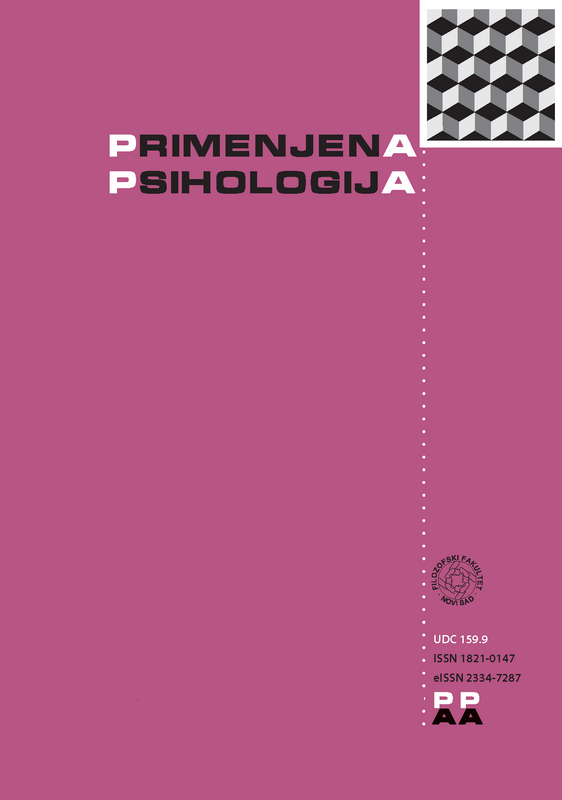NUMBER OF SENSORY MODALITIES THROUGH WHICH A CONCEPT CAN BE EXPERIENCED: EFFECT ON RECALL
DOI:
https://doi.org/10.19090/pp.2015.3.335-352Keywords:
number of sensory modalities effect, concreteness effect, free recall, cued recall, paired-associate learningAbstract
The goal of this study was to test whether the accuracy of recall is influenced by the number of sensory modalities through which a concept can be experienced – a new variable closely related to word concreteness. Based on processing advantage of concepts that can be experienced through higher number of senses (fish) over the ones experienced through lower number of senses (moon), we hypothesized that the effect of number of senses will be observed in recall tasks, as well. In the first experiment, we presented pairs of related words to four groups of participants in the paired associate learning paradigm. Half of the participants were engaged in free recall, and half in cued recall. Each task was applied to two lists of stimuli. Within each list, half of the words were abstract, and half were concrete. Abstract words were identical across lists, whereas concrete words differed with respect to the number of modalities: one list consisted of concepts that can be experienced through a great number of senses, and another one contained those of a small number of sensory modalities. In addition to the traditional concreteness effect and that of the task, we observed the hypothesized effect of the number of sense modalities as well. As expected, participants were more accurate in cued recall task, more accurate when recalling concrete words, and more accurate when recalling concrete words with a large number of sensory modalities. The number of modalities effect was observed in the second experiment, where participants were presented with all three groups of words. To our best knowledge, this finding is the first demonstration of the effect of number of sensory modalities on memory processes. Finally, as expected, we observed that the concreteness effect was more pronounced in cued recall task. However, this interaction was not observed in the second experiment. Hence, we suggest further research of this phenomenon.References
Barsalou, L. W. (1999). Perceptual symbol systems. Behavioral and Brain Sciences, 22, 577–660.
http://dx.doi.org/10.1017/s0140525x99002149
Barsalou, L. W. (2003). Situated simulation in the human conceptual system. Language and Cognitive Processes, 18, 513–562.
http://dx.doi.org/10.1080/01690960344000026
Barsalou, L. W. (2009). Simulation, situated conceptualization and prediction. Philosophical Transactions of the Royal Society B, 364, 1281–1289.
http://dx.doi.org/10.1098/rstb.2008.0319
Barsalou, L. W. (2010). Grounded cognition: Past, present, and future. Topics in Cognitive Science, 2, 716–724.
http://dx.doi.org/10.1111/j.1756-8765.2010.01115.x
Begg, I. (1973). Imagery and integration in the recall of words. Canadian Journal of Psychology, 27, 159–167.
http://dx.doi.org/10.1037/h0082465
Bickhard, M. (2008). Is embodiment necessary? In P. Calvo & T. Gomila (Eds.), Handbook of cognitive science: An embodied approach (pp. 29–40). Amsterdam: Elsevier.
http://dx.doi.org/10.1016/B978-0-08-046616-3.00002-5
Bleasdale, F. A. (1987). Concreteness-dependent associative priming: Separate lexical organization for concrete and abstract words. Journal of Experimental Psychology: Learning, Memory, and Cognition, 13, 582–584.
http://dx.doi.org/10.1037/0278-7393.13.4.582
Cordier, F., & Le Ny, J.-F. (2005). Evidence of several components for word familiarity. Behavior Research Methods, 37, 528-537.
http://dx.doi.org/10.3758/BF03192724
Fliessbach, K., Weis, S., Klaver, P., Elger, C. E., & Weber, B. (2006). The effect of word concreteness on recognition memory. Neuroimage, 32, 1413–1421.
http://dx.doi.org/10.1016/j.neuroimage.2006.06.007
Fodor, J. A. (1975). The language of thought. Cambridge, MA: Harvard University Press.
Fodor, J., & Pylyshyn, Z. (1988). Connectionism and cognitive architecture: A critical analysis. Cognition, 28, 3–71.
http://dx.doi.org/10.1016/0010-0277(88)90031-5
Gallese, V., & Lakoff, G. (2005). The brain's concepts: The role of the sensory-motor system in reason and language. Cognitive Neuropsychology, 22, 455–479.
http://dx.doi.org/10.1080/02643290442000310
Holocomb, P. J., Kounios, J., Anderson, J. E., & West, W. C. (1999). Dual-coding, context-availability, and concreteness effect in sentence comprehension: An electrophysiological investigation. Journal of Experimental Psychology: Learning, Memory and Cognition, 25, 721–742.
http://dx.doi.org/10.1037/0278-7393.25.3.721
Horowitz, L. M., & Prytulak, L. S. (1969). Redintegrative memory. Psychological Review, 76, 519–531.
http://dx.doi.org/10.1037/h0028139
Kiefer, M., & Barsalou, L. W. (2013). Grounding the human conceptual system in perception, action, and internal states. In W. Prinz, M. Beisert, & A. Herwig
http://dx.doi.org/10.7551/mitpress/9780262018555.003.0015







